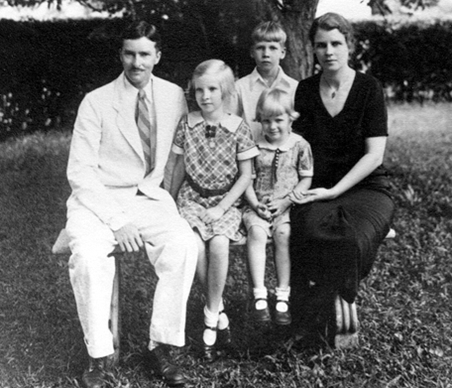Guest posting by Special Collections staff member
Kenneth Landon graduated from Wheaton in 1924, just ahead of his wife-to-be Margaret (Class of ’25). Newly married and full of hope, they set out in 1927 for a lifetime of ministry in Southeast Asia with the Presbyterian Mission. For most of their decade of service in Siam, they were stationed at Trang, 500 miles south of Bangkok.
The Landons had considered their call into mission to be life-long. How then did it come about that just ten years into their work in Thailand, they came home on furlough never to return as missionaries? As you might imagine, multiple and complex issues were involved. The fact that their resignation letter, dated October 9, 1940, runs twenty one typed, double-spaced pages attests to that.
The letter, written after three years away from Thailand and a year after they formally severed ties with the Mission, details their reasons for leaving. There had been serious conflict between the Landons and the leadership of the Presbyterian Mission in Thailand. Yet the Landons alleged that the problems pre-dated their arrival in Thailand. On page two of the letter, we read: “The inharmoniousness of the Mission was clearly evident when we joined it in 1927.”
The lightning rod for their criticisms was the Mission’s Executive Secretary, the Rev. Paul Eakin. Writing in 1940, the Landons decried the fact that “strifes, jealousies, and antagonisms are worse now than they were thirteen years ago.” The Landons’ enumeration of Eakin’s alleged misdeeds runs the entire length of the letter. Chief among their concerns were a “policy of secrecy”–poor communication within the Mission, together with personal animosity and slander on the part of Eakin toward themselves.
But there were wider issues as well. The Landons did not agree with the overall emphasis of the Mission at that time. It was a period of growing institutionalism; evangelistic efforts were being curtailed in favor of educational and medical work. The Landons charge in the letter that “Mr. Eakin has openly opposed the work of evangelistic missionaries like…ourselves.”
Kenneth, looking back at the situation decades later, asserted (in The Landon Chronicles) that the Mission had been “absolutely backward and without vision,” and that the Mission people were “not raising up a national church, as they should, and were failing to do the obvious things to create an indigenous, Thai church.” It is interesting to compare the substance of the carefully-worded 1940 letter with Kenneth’s less-guarded comments forty years later. In the latter account there is no mention of Eakin; he speaks only against “the Mission.” Perhaps time had faded or healed the memories and it was no longer personal; the passage of forty years certainly had given him a broader perspective.

The Landons’ exit from Siam in 1937 is a case study in missionary attrition. The cause of Christ in Thailand lost two sharp and passionate minds–at least as far as their presence on the ground as missionaries. No doubt they continued to engage in the spiritual battle, helping the fledgling Thai church through their prayers in the ensuing decades. They also maintained a number of relationships with Thai friends–Christians and non-Christians alike. Both Kenneth and Margaret distinguished themselves in other pursuits following their resignation from the Presbyterian Mission. Kenneth worked for the government as a specialist in Southeast Asian affairs. Margaret became a notable author, best known for her work Anna and the King of Siam, upon which the Broadway hit The King and I is based. Yet, what might their talents and drive have contributed to the mission to reach the Thai people in the 1940’s and beyond?
The Landons’ resignation letter is part of a larger body of material that had been restricted until 2010.
———-
The Margaret and Kenneth P. Landon Papers are housed in the Wheaton College Archives & Special Collections and are available for research.